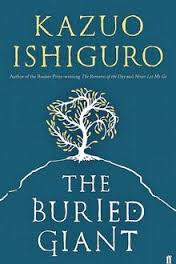 Most people with even a passing interest in what we care to call the politics of genre will have been aware of the recent pseudo-spat between Ursula Le Guin and Kazuo Ishiguro. I say pseudo-spat because that’s exactly what it was. Le Guin reacted to something Ishiguro never said, or rather, he didn’t say it in quite the way she thought he meant it (he explains himself here). Two days later she apologises for any offence she might have caused, and then admonishes Ishiguro for taking her own words in vain. “Many sites on the Internet were quick to pick up my blog post, describing it as an “attack”, a “slam”, etc,” she says. “They were hot on the scent for blood, hoping for a feud. I wonder how many will pick up this one?”
Most people with even a passing interest in what we care to call the politics of genre will have been aware of the recent pseudo-spat between Ursula Le Guin and Kazuo Ishiguro. I say pseudo-spat because that’s exactly what it was. Le Guin reacted to something Ishiguro never said, or rather, he didn’t say it in quite the way she thought he meant it (he explains himself here). Two days later she apologises for any offence she might have caused, and then admonishes Ishiguro for taking her own words in vain. “Many sites on the Internet were quick to pick up my blog post, describing it as an “attack”, a “slam”, etc,” she says. “They were hot on the scent for blood, hoping for a feud. I wonder how many will pick up this one?”
Le Guin may have been a little hasty in ‘flying off the handle’, as she herself put it, but she is certainly justified in her assessment and condemnation of internet blood-lust. As Le Guin suggests, these kind of clickbait articles are annoying and pointless and increasingly tedious precisely because they polarise opinion so swiftly and so absolutely they shut off the opportunity for a more in-depth debate. Read what they’ve actually said and it’s quite obvious that Le Guin and Ishiguro have far more in common than divides them, and I for one would love to see a conversation between them in which they could discuss, as Le Guin suggested, the fictional validity of dragons versus pixies (and I’d lay money on Ishiguro being up for it, too). But then, so far as the internets is concerned at least, informed and reasoned discussion isn’t anywhere near as thrilling as gladiatorial combat.
Far from being dismissive, Ishiguro’s views on the uses of fantasy would appear to be cogent, inclusive and sophisticated. In the original New York Times interview that sparked all the fuss, Ishiguro states the ‘barren, weird England’ of his fictional Dark Ages provides an ideal metaphorical landscape for the story of moral evasion and wilful forgetting he wanted to explore. In another interview for The Guardian, he explains his own magic system straightforwardly and without prevarication: “I didn’t want a fantasy world where anything weird could happen. I went along with what happened in the Samurai tales I grew up on. If it’s conceivable that the people of the time had these superstitions or beliefs, then I would allow it.”
I would say Ishiguro totally gets what fantasy is for and what it can do. So why the disinclination, in certain quarters, to admit that, even as a possibility?
The longlist for the Bailey’s Women’s Prize for Fiction was announced at midnight last night. It’s an odd one. It includes a number of books – historical, social-realist fiction – of the kind that I find least interesting, at least in outline. (Personally I much preferred Naomi Frisby’s hypothetical line-up at The Writes of Woman which, just in case you haven’t discovered it yet, is one of the best book blogs around.) But the list does include some outstanding writers (Ali Smith, Rachel Cusk, Xiaolu Guo, Grace McCleen) and it also includes six novels that are either blatantly speculative, or that contain strong speculative elements. Looking down the longlist for the first time, I found myself wondering whether novels such as Emily St John Mandel’s Station Eleven, Laline Paull’s The Bees, or Sandra Newman’s The Country of Ice Cream Star (I’m a big Station Eleven fan, but seeing The Bees and Ice Cream Star here pleases me especially because these two books have been excluded from SFF discussions more or less entirely) would have stood a chance of being selected even a decade ago. Does the appearance of such books here now signal a genuine shift in literary attitudes towards the leitmotifs (see, I’m deliberately eschewing the word ‘tropes’) and preoccupations of science fiction and fantasy, as Ishiguro seems to suggest, as Le Guin appears so reluctant to believe?
I don’t know if this question has an answer yet. But it’s worth putting out there.